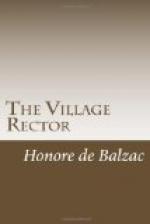“Oh!” exclaimed Madame Graslin, looking at Roubaud, “can’t politics get on without the wit of journalism, even here?”
“In this lamentable business, the bourgeoisie plays the same role as the pioneers of America,” continued Clousier. “It buys up great estates, which the peasantry could not otherwise acquire. It cuts them up and then sells, either at auction or in small lots at private sale, to the peasants. Everything is judged by figures in these days, and I know none more eloquent than these. France has ninety-nine million acres, which, subtracting highways, roads, dunes, canals, and barren, uncultivated regions deserted by capital, may be reduced to eighty millions. Now out of eighty millions of acres to thirty-two millions of inhabitants we find one hundred and twenty-five millions of small lots registered on the tax-list (I don’t give fractions). Thus, you will observe, we have gone to the utmost limit of agrarian law, and yet we have not seen the last of poverty or dissatisfaction. Those who divide territory into fragments and lessen production have, of course, plenty of organs to cry out that true social justice consists in giving every man a life interest, and no more, in a parcel of land; perpetual ownership, they say, is robbery. The Saint-Simonians are already proclaiming that doctrine.”
“The magistrate has spoken,” said Grossetete, “and here’s what the banker adds to those bold considerations. The fact that the peasantry and the lesser bourgeoisie can now acquire land does France an injury which the government seems not even to suspect. We may estimate the number of peasant families, omitting paupers, at three millions. These families subsist on wages. Wages are paid in money, and not in kind—”
“Yes, that’s another blunder of our laws!” cried Clousier, interrupting the banker. “The right to pay in kind might have been granted in 1790; now, if we attempted to carry such a law, we should risk a revolution.”
“Therefore, as I was about to say, the proletary draws to himself the money of the country,” resumed Grossetete. “Now the peasant has no other passion, desire, or will, than to die a land-owner. This desire, as Monsieur Clousier has well shown, was born of the Revolution, and is the direct result of the sale of the National domain. A man must be ignorant indeed of what is going on all over France in the country regions if he is not aware that these three million families are yearly hoarding at least fifty francs, thus subtracting a hundred and fifty millions from current use. The science of political economy has made it an axiom that a five-franc piece, passing through a hundred hands in one day, is equivalent to five hundred francs. Now, it is perfectly plain to all of us who live in the country and observe the state of affairs, that every peasant has his eye on the land he covets; he is watching and waiting for it, and he never invests his savings elsewhere;




